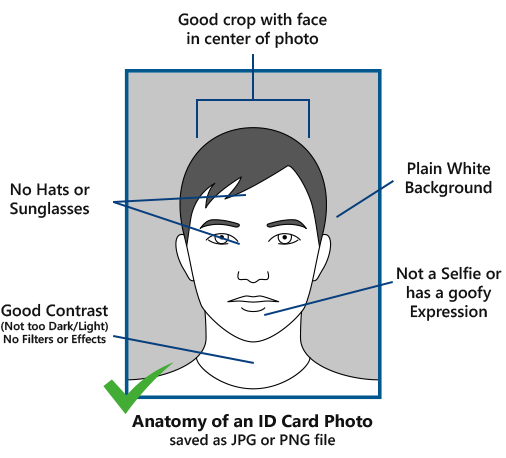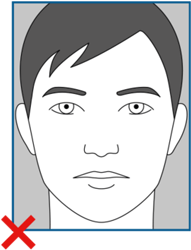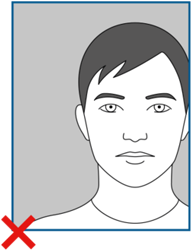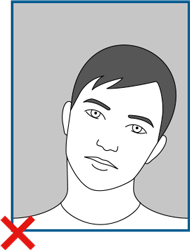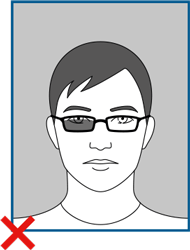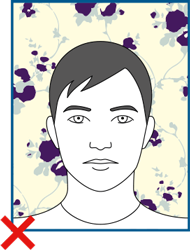Guideline for Submitting Graphics
Best practices for preparing your graphic files.
Resolution
Maximum resolutions
In some instances, resolution on files are excessive. This causes long/incomplete download times
and possible editing/processing delays. If you are not sure what resolution would be suffucient,
please contact us.
Visual comparison of different resolutions:
The resolution comparison chart below is best viewed at 100% zoom on your monitor and
observed from few feet away. Based on viewing distance to graphics, some prints will look better
than what you see on your monitor.
Minimum resolutions for 4-8ft (normal) viewing distance
Resolution should be 60dpi (100dpi is preferred).
60 dpi produces good looking images from a normal viewing distance of 4-8 ft.
This formula applies to art when supplied at 100% scale (1:1).
When using a different scale, resolution increases accordingly:
- Artwork 1:2 scale -120dpi or more
- Artwork 1:5 scale -240dpi or more
- Artwork 1:10 scale - 600dpi or more
Minimum resolutions for 15ft (normal) viewing distance
For very large prints, such as hanging banners, when viewing distance is over 15 ft, the minimum
resolution can drop down to 30dpi (at 100% scale). If your file already has a greater resolution, leave it
as is. A higher dpi is always preferred.
As large graphics are often created in scale, please use the list below to estimate your resolution:
- Banner art submitted at 1:2 scale - minimum resolution should be 60dpi or more.
- Banner art submitted at 1:4 scale minimum resolution should be 120dpi or more.
- Banner art submitted at 1:8 scale - minimum resolution should be 240dpi or more.
Adobe Photoshop Files
Regular (flat) images
Save images as CMYK and choose Photoshop.eps format: Select 8-bit preview and
jpeg (max quality).
Tip: Illustrator can take advantage of this format for very fast file handlling.
Select "Use Low Resolution Proxy for Eps images" in Illustrator preferences.
Complex images
If your images contain layers, clipping paths, spot colors, effects, etc., save as TIF.
Tip: Select LZW compression. It's a lossless compression that allows you to preserve
layers, while decreasing file size.
Adobe Creative Cloud
We welcome the use of Creative Cloud libraries and invite you to include Adobe Stock
images and fonts in your library.
Adobe Illustrator Files
Saving print files as.ai
Illustrator PRINT files can be saved as.ai files.
Please match screenshot settings:
- "Create PDF Compatible File" MUST be on.
- Artboards can be separated into individual files (range).
Saving print files as.pdf
Illustrator PRINT files can be also saved as PDF files.
It is very important to select the compatible PDF format.
- We recommend PDF/X-4 standard.
- Select "Save each artboard to a separate file" and "Range."
The best way to send files is to provide Packaged Native files from Illustrator
accompanied with Print files.
Illustrator Native files:
- Place all the images as links.
- Save as a.ai file with "Use Compression" option.
- "PRINT" folder.
Adobe InDesign Files
Native files
Save and Package all your InDesign files accompanied with Print PDF files.
- Export print files as PDF/X-4:2008.
- Create separate _PRINT folder.
- If you are using Mac fonts (non-OTF) please zip the folder before submitting.
- If you are not sure, you may outline the fonts.
Package native files (INDD, links and fonts)
Go to File/Package and complete the steps. Watch for any warning signs as some files
might be missing.
Vector art
Logos should be vector and have outlined fonts. If vector version is not available, provide hi-res
(high resolution) images
Native version (editable)
We strongly recommend submitting editable version of the files as well, including links and
fonts. This is valuable in case a new PRINT file has to be generated. The best way to provide
native files is by "Packaging" (File/Package). If you are a Mac user and your fonts are other than
.otf, please zip packaged files.
Color profiles
For accurate color preview, use profiles and settings listed below. We are a G7 certified
company. Our color manegement revolves around Gracol standards. We use GRACoL2006
Coated1v2 profile for CMYK and Adobe RGB 1998 for RGB images. Please note that your
screen has to be calibrated and profiled in order to display accurate color rendering.
Packaging
This is an important step since it collects all the links and fonts we may need. If you are using
Mac fonts (non-OTF) please zip the folder before submitting. If you are not sure, you may
outline the fonts.
Submitting Files
You should send a link to the your project designer and account manager for submitting your files. If you have questions about this process, please contact your project representative














